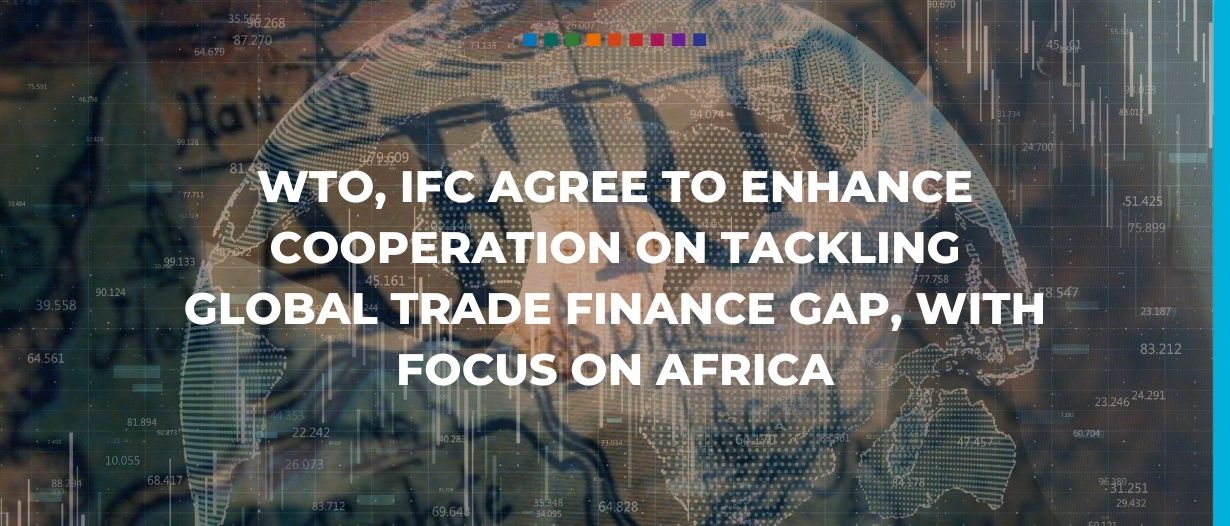The heads of the World Trade Organization (WTO) and the International Finance Corporation (IFC) have unveiled new plans designed to help tackle the global trade finance gap.
In a joint statement, the heads of the WTO and IFC said they will enhance cooperation and explore ways to improve the availability of trade finance for developing countries most in need.
The two organisations pledged to improve the analytics, identification, and detection of trade finance gaps, in order to better direct capacity-building and other resources where unmet demand is greatest, particularly in Africa.
Signed by WTO Director-General Ngozi Okonjo-Iweala and IFC Managing Director Makhtar Diop, the joint statement calls for urgent action to tackle the high costs and barriers to trade faced by businesses in emerging markets.
“Trade would not happen without trade finance,” said Okonjo-Iweala and Diop.
“Yet, in many developing countries, increased trade finance costs during the pandemic are adding to the already high cost of physically moving critical goods and commodities across borders.
“Trade costs in Africa, for example, can be as high as 300% of the value of the merchandise being traded.
“Meanwhile, the cost of trade finance – for example, confirmed letters of credit – has increased during the pandemic, and is six to seven times more expensive in Africa than in OECD countries.”
Boosting our cooperation with @IFC_org on Trade Finance. During the pandemic, rejection rates for women-led SMEs rose to 70%. Global trade finance gaps increased from $1.5 to $1.7 trillion. Click on the link to watch my discussion with @Diop_IFC! https://t.co/fsr4sotGFX
— Ngozi Okonjo-Iweala (@NOIweala) November 30, 2021
In 2020, as reported by Trade Finance Global, the global trade finance gap hit $1.7 trillion, up from a previous all-time high of $1.5 trillion in 2018, according to the Asian Development Bank (ADB).
Citing ADB’s data, Okonjo-Iweala and Diop said that basic trade finance lines are not even available locally in many emerging markets, particularly for small and medium-sized enterprises (SMEs).
They also point out that, globally, over 40% of SMEs’ trade finance requests are rejected, and 70% are rejected when made by women-owned SMEs.
“When trade finance requests are accepted, often the most expensive form of trade finance is proposed,” they said, such as “collateralized working capital financing at very high rates.
“In this context, it is no surprise that global trade finance gaps, mainly in developing countries, have increased during the pandemic, reaching $1.7 trillion.”
Five key focus areas
The joint statement ends with a list of five key focus areas that the WTO and IFC will collaborate on.
One overarching theme is that both organisations want to work to reduce knowledge gaps and improve the quality of trade finance education in emerging markets, which they see as one of the main causes of trade finance gaps.
For reference, Trade Finance Global has republished the five key areas in full below:
Trade finance gap study
The WTO and IFC will work together to improve the identification of trade finance gaps, notably in Africa, where the gaps are considerably high.
Improved country-focused surveys will help target priority markets in which the mismatch between supply and demand is particularly high, and will help IFC implement the $1 billion Africa Trade Recovery Initiative launched in May 2021.
Improving the diagnostics of local trade finance impediments
IFC and the WTO will work with small traders and financial institutions at the local level to better understand the ecosystem of trade finance.
With this data, we will be able to maximize the impact of our partnership to address these challenges.
Small traders and financial institutions will be surveyed in the context of existing mechanisms, such as the WTO’s Enhanced Integrated Framework and IFC’s annual client survey.
Strengthening trade finance training programs for SME importers and exporters
Trade finance training programs for SMEs have seen considerable interest in low-income, fragile, and vulnerable economies where companies are subject to the highest rejection rates.
To further support SME exporters and importers that are suffering from disrupted supply chains caused by the pandemic, IFC has launched pilot trade finance training programs for SMEs.
Building on programs already underway, IFC and the WTO will work mainly in Africa to improve access to trade finance training programs in emerging markets.
Strengthening local financial institutions’ capacity to meet compliance challenges
Meeting transparency standards, such as being able to detect Trade Based Money Laundering (TBML), is key to maintaining trade and financial relations in global markets, notably through Correspondent Banking Relationships (CBRs).
IFC and the WTO will expand training and capacity-building programs, mainly targeting Africa, to help emerging market financial institutions meet compliance challenges.
Sharing knowledge and raising awareness of trade finance support programs
The global pandemic has had a disproportionate impact in emerging markets, limiting access to trade finance.
While the demand for trade finance support from Development Financial Institutions (DFIs) is high, these programs are not always well known by the trading community.
IFC and the WTO will launch a joint research initiative by facilitating workshops for exporters and importers to identify the level of awareness of DFIs’ trade finance support programs.
This will help develop solutions to address the trade finance “information gap.”





























